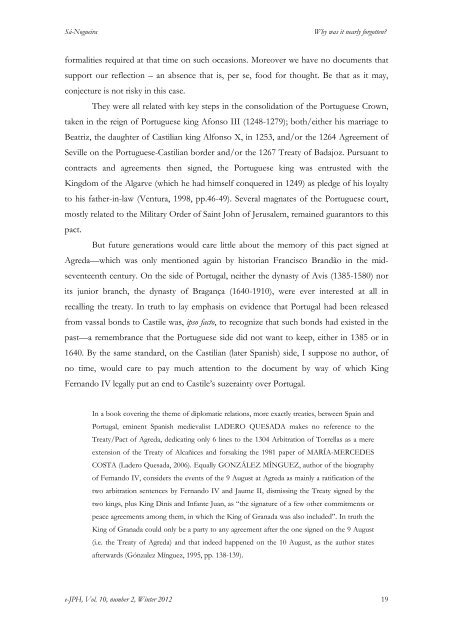Why was it nearly forgotten? The Agreda Treaty ... - Brown University
Why was it nearly forgotten? The Agreda Treaty ... - Brown University
Why was it nearly forgotten? The Agreda Treaty ... - Brown University
You also want an ePaper? Increase the reach of your titles
YUMPU automatically turns print PDFs into web optimized ePapers that Google loves.
Sá-Nogueira<br />
<strong>Why</strong> <strong>was</strong> <strong>it</strong> <strong>nearly</strong> <strong>forgotten</strong>?<br />
formal<strong>it</strong>ies required at that time on such occasions. Moreover we have no documents that<br />
support our reflection – an absence that is, per se, food for thought. Be that as <strong>it</strong> may,<br />
conjecture is not risky in this case.<br />
<strong>The</strong>y were all related w<strong>it</strong>h key steps in the consolidation of the Portuguese Crown,<br />
taken in the reign of Portuguese king Afonso III (1248-1279); both/e<strong>it</strong>her his marriage to<br />
Beatriz, the daughter of Castilian king Alfonso X, in 1253, and/or the 1264 Agreement of<br />
Seville on the Portuguese-Castilian border and/or the 1267 <strong>Treaty</strong> of Badajoz. Pursuant to<br />
contracts and agreements then signed, the Portuguese king <strong>was</strong> entrusted w<strong>it</strong>h the<br />
Kingdom of the Algarve (which he had himself conquered in 1249) as pledge of his loyalty<br />
to his father-in-law (Ventura, 1998, pp.46-49). Several magnates of the Portuguese court,<br />
mostly related to the Mil<strong>it</strong>ary Order of Saint John of Jerusalem, remained guarantors to this<br />
pact.<br />
But future generations would care l<strong>it</strong>tle about the memory of this pact signed at<br />
<strong>Agreda</strong>—which <strong>was</strong> only mentioned again by historian Francisco Brandão in the midseventeenth<br />
century. On the side of Portugal, ne<strong>it</strong>her the dynasty of Avis (1385-1580) nor<br />
<strong>it</strong>s junior branch, the dynasty of Bragança (1640-1910), were ever interested at all in<br />
recalling the treaty. In truth to lay emphasis on evidence that Portugal had been released<br />
from vassal bonds to Castile <strong>was</strong>, ipso facto, to recognize that such bonds had existed in the<br />
past—a remembrance that the Portuguese side did not want to keep, e<strong>it</strong>her in 1385 or in<br />
1640. By the same standard, on the Castilian (later Spanish) side, I suppose no author, of<br />
no time, would care to pay much attention to the document by way of which King<br />
Fernando IV legally put an end to Castile’s suzerainty over Portugal.<br />
In a book covering the theme of diplomatic relations, more exactly treaties, between Spain and<br />
Portugal, eminent Spanish medievalist LADERO QUESADA makes no reference to the<br />
<strong>Treaty</strong>/Pact of <strong>Agreda</strong>, dedicating only 6 lines to the 1304 Arb<strong>it</strong>ration of Torrellas as a mere<br />
extension of the <strong>Treaty</strong> of Alcañices and forsaking the 1981 paper of MARÍA-MERCEDES<br />
COSTA (Ladero Quesada, 2006). Equally GONZÁLEZ MÍNGUEZ, author of the biography<br />
of Fernando IV, considers the events of the 9 August at <strong>Agreda</strong> as mainly a ratification of the<br />
two arb<strong>it</strong>ration sentences by Fernando IV and Jaume II, dismissing the <strong>Treaty</strong> signed by the<br />
two kings, plus King Dinis and Infante Juan, as “the signature of a few other comm<strong>it</strong>ments or<br />
peace agreements among them, in which the King of Granada <strong>was</strong> also included”. In truth the<br />
King of Granada could only be a party to any agreement after the one signed on the 9 August<br />
(i.e. the <strong>Treaty</strong> of <strong>Agreda</strong>) and that indeed happened on the 10 August, as the author states<br />
afterwards (Gónzalez Mínguez, 1995, pp. 138-139).<br />
e-JPH, Vol. 10, number 2, Winter 2012 19
















